|
An Excellent and Overdue Revival
of
"You Never Can Tell"
by Paulanne Simmons
You Never Can Tell
Directed by David Staller
The Pearl Theatre Company
555 West 42 Street
From Sept. 3, 2013
Tues. at 7pm, Wed., Sat. & Sun. at 2pm, Tues.-Sat at 8pm
Tickets: $65, Seniors $35, Student and Thursday Rush $20 (212) 563-9261
or pearltheatre.org
Closes Oct. 13, 2013
The title of George Bernard Shaw’s 1897 play, “You Never
Can Tell,” is a pretty good indication of what the playwright
is trying to tell us. The phrase is repeated several times by he wise
waiter, Walter Boon, while meditating on the problems of a family
in which the father has been banished and the eldest daughter finds
herself falling in love with a penniless dentist and about to abandon
her mother’s feminist ideals.
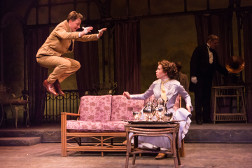 |
Sean
McNall, Amelia Pedlow, Dan Daily (background) Photos by All
Foote III |
"You Never Can Tell" uses Shakespearean comedic techniques
(mistaken identity, unknown parentage) to explore the conflict between
traditional love and marriage, and modern, more egalitarian views
on the subjects. In fact, that very wise waiter has been dubbed “William”
because of his resemblance to the Bard.
The play has also been called a satire on Oscar Wilde’s own
tale of mistaken identity, “The Importance of Being Earnest.”
Only in Shaw’s world, the rich can be a lot more sinister than
merely lovable and foolish. Both the lightness and gravity of Shaw’s
approach can be seen in The Pearl Theatre Company’s revival,
the first in fifteen years.
"You Never Can Tell" takes place at the turn of the century
when Victorian society found itself attacked by a host of radical
political and social theories. Margaret Clandon (Robin Leslie Brown)
has returned to England with her two daughters, Gloria (Amelia Pedlow)
and Dolly (Emma Wisniewski), and son Philip (Ben Charles), after eighteen
years of living in Madeira. The children are eager to find out who
their absent father is, and Mrs. Clandon is equally eager to keep
them in the dart - until a certain Fergus Crampton (Bradford Cover)
shows up to claim his paternal rights.
The play is directed by David Staller, the founder/artistic director
of Gingold Theatrical Group and a frequent international lecturer
of all things Shaw. His thorough understanding of GBS is evident throughout.
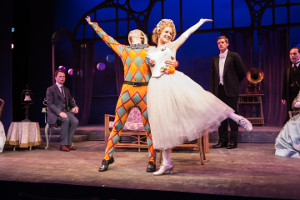 |
| Sean
McNall, Ben Charles, Emma Wisniewski, Zachary Spicer, Dominic
Cuskern photos by All Foote III. |
In the first place, the cast is so perfect one hesitates to single
out any one actor at the risk of slighting another. Nevertheless,
one cannot help but mention the superb Brown, whose commanding gestures
and supercilious tongue are riveting. Wisniewski and Charles are effective
as the clownish younger siblings. And Dan Daily, despite the strength
of his colleagues’ performances, comes close to stealing the
show as the very proper and perspicacious waiter who knows lots more
than he’s saying.
What’s more, Harry Feiner has created a beautiful Victorian
set that is both elegant and evocative of the times. And Barbara A
Bell’s costumes emphasize not only the era but also the characters’
personalities and changing perspective. Thus Dolly and Philip sport
whimsical and silly matching attire throughout, and Gloria exchanges
her masculine suit and tie for a dazzling gown when she throws her
lot in with her dentist, Mr. Valentine (the excellent Sean McNall).
Like all of Shaw’s play, "You Never Can Tell" is
the product of Victorian society and a mind shaped by it. And like
most of Shaw’s plays, it is saved from irrelevance today by
Shaw’s tremendous wit and the fact that people don’t really
change as much as we would like to believe they do. However, the task
of making Shaw exciting to modern audiences becomes even smoother
when the play is produced by such a talented group as the one gathered
for The Pearl Theatre Company and the Gingold Theatrical Group’s
co-production of "You Never Can Tell."
“Shaw’s
“You Never Can Tell”
satirizes Victorian “modern” relationships
by Lucy Komisar
“You Never Can Tell.”
Written by George Bernard Shaw, directed by David Staller.
Pearl Theatre, 555 West 42nd Street, New York City (at 11th Avenue)
(212) 563-9261, http://www.pearltheatre.org/
Opened Sept 15, 2013, closes October 13, 2013.
I wondered why the Pearl Theatre Company decided to stage George
Bernard Shaw’s “You Never Can Tell.” Shaw (1856-1950),
who wrote more than 60 plays, is known for trenchant political criticism
of the economic and social systems of the London he inhabited. He
was a socialist and a feminist, a free thinker. His plays skewer the
hypocrisy and pompousness of British 1% society.
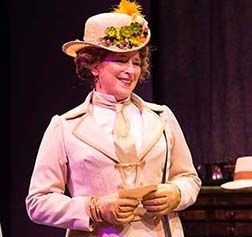 |
| Robin
Leslie Brown as Mrs Clandon. Photo Al Foote III. |
Yet in spite of the requisite good social politics, this 1897 play
about marriage and the relations between the sexes is a fluffy confection.
It’s part of a group called the “Plays Pleasant.”
Then I learned that this is the final work in director David Staller’s
marathon staging of every Shaw play. Maybe Shaw was taking a rest
from serious stuff. But even lesser Shaw can be diverting if it is
given a good production, as it is here by the Pearl.
Mrs. Clandon (Robin Leslie Brown), having fled her husband 18 years
before, is residing with her grown children Gloria (Amelia Pedlow),
Phillip (Ben Charles) and Dolly (Emma Wisniewski) in a seaside village
in England where they’ve just arrived after their years in Madeira.
While on that Portuguese island, she had written a modern woman’s
best seller, the “Twentieth Century Treatises,” which
attacked
“a life in which husbands open their wives’ letters and
call on them to account for every farthing of their expenditure and
every moment of their time; in which women do the same to their children;
in which no room is private and no hour sacred; in which duty, obedience,
affection, home, morality and religion are detestable tyrannies, and
life is a vulgar round of punishments and lies, jealousy, suspicion.”
That’s the feminist Shaw speaking. But those assertions really
don’t anchor the play beyond suggesting why Mrs. Clandon left
her husband.
The stage story begins when daughter Dolly goes to a beginning dentist,
Valentine (Sean McNall), who pulls her tooth. Without gas. She tells
him “It’s your business to hurt people.” Turns out
she didn’t have the 5 Shillings for the gas.
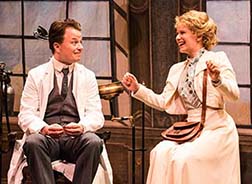 |
| Sean
McNall as Valentine, Emma Wisniewski as Dolly,P hoto Al Foote
III. |
McNall doesn’t make him seem more than the jerk he might be.
He will end up falling for Dolly’s sister, Gloria (Amelia Pedlow),
a modern women who evinces no interest in love and marriage. But Valentine
is not given that name for nothing.
The children complain that they want to know who their father is.
Their mother replies, “I have kept him out of your life: keep
him now out of mine by never mentioning him to me again.” But
now that they are in England, she plans to have her solicitor finally
inform them. Her meeting with the lawyer, Finch McComas (Dominic Cuskern),
offers more opportunity for Shaw’s feminism. McComas asks “…you
are still ready to make speeches in public, in spite of your sex?
To insist on a married woman’s right to her own separate property?
To champion Darwin’s view of the ‘origin of species’,
to read Huxley and George Eliot, and to demand University degrees,
the opening of the professions, and the parliamentary franchise for
women as well as men?”
Well, of course, and she has educated Gloria to take up her work.
He replies that times have changed, that “There is only one
place in all of England where your opinions would still pass as shockingly
advanced. … the theatre.” A good dig by playwright Shaw
at theatrical censorship, which he endured.
Meanwhile, Valentine also pulls the tooth of his landlord, who has
broken it on a Brazil nut. Seems that’s the way he always cracks
nuts. And he brings him to lunch at the Clandons. The family has just
been told by the solicitor that the landlord is the long estranged-husband
and father, Fergus Crampton (Bradford Cover). Mrs. Clandon had changed
the family name.
 |
Zachary
Spicer as Walter Bohun and Dan Daily as his
father the butler Walter Boon, Photo Al Foote III. |
The most sensible person in the bunch appears to be the butler, Walter
Boon (Dan Daily). He is a calming influence, and whenever something
untoward happens, he intones, “You never can tell.” Daily
is smart and fresh in the role, “to the manor servant born,”
one might say.
The butler’s son turns out to be a Queens Counsel who spells
his name Walter Bohun (Zachary Spicer). The butler dropped the h because
it was “Norman,” which he thought not a good recommendation
for a waiter at a seaside resort. The waiter tells Crampton, “where’s
the difference after all? If I must put on a dress coat to show what
I am, sir, he must put on a wig and gown to show what he is. If my
income is mostly tips, and there’s a pretense that I don’t
get them, why, his income is mostly fees, sir; and I understand there’s
a pretense that he doesn’t get them!”
In a display of social snobbery, Crampton is annoyed at the waiter
entering the conversation. He says, “While he’s a waiter
it’s his business to wait. If you had treated him as a waiter
ought to be treated, he’d have held his tongue. His daughter
Dolly rejoins, “What a loss that would have been! Perhaps he’ll
give us an introduction to his son and get us into London society.”
And her father declares, “London society! You’re not fit
for any society, child.” The lunch is a disaster.
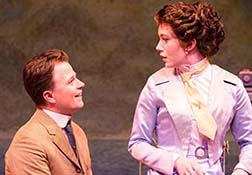 |
| Sean
McNall as Valentine, Amelia Pedlow as Gloria, Photo Al Foote III. |
Crampton’s efforts to reconcile with the children are unavailing.
He couldn’t be more retrograde. He tells Gloria he expects from
his children “duty, affection, respect, obedience!”
She replies, “I obey nothing but my sense of what is right.
I respect nothing that is not noble. That is my duty. As to affection,
it is not within my control. I am not sure that I quite know what
affection means.”
He reminds her that as a child he let her come to his study and never
said a word –except to tell her that she must sit still and
not speak. And it goes on with Shaw skewering Victorian society. Gloria
will tell Valentine, “I do not think the conditions of marriage
at present are such as any self-respecting woman can accept.”
There ensues a funny pas de deux, a satire of Valentine’s attempt
to entrap Gloria into love. He admits to Mrs. Clandon, “I learnt
how to circumvent the Women’s Rights woman before I was twenty-three:
it’s all been found out long ago. You see, my methods are thoroughly
modern.” It wouldn’t have worked for an old-fashioned
girl. Shaw shows the verbal courtship as a bit ridiculous.
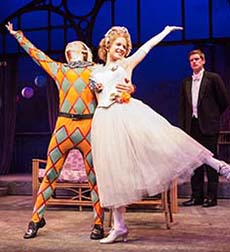 |
Ben
Charles as Philip and Emma Wisniewski as
Dolly, Photo Al Foote III. |
So are the expectations of parents. Crampton challenges the separation
agreement with his wife and says he wants custody of the two younger
kids though he doesn’t like their behavior or dress.
The Queens Counsel advises him, “You think you’d like
to have your two youngest children to live with you. Well, you wouldn’t….
You’d want this young lady here to give up dressing like a stage
columbine in the evening and like a fashionable columbine in the morning.
Well, she won’t—ever.”
In the end, a lot of social expectations are upended. As Shaw
would says, “you never can tell.”
Robin Leslie Brown is always ballast in any play. Charles and Wisniewski
are good as Phillip and Dolly. Spicer makes a lively, challenging
Queens Counsel. The sets by Harry Feiner are colorful and charming.
Albeit not one of Shaw’s best, “You Never Can Tell”
is fun for those who want to see the master’s entire oeuvre.
Visit Lucy Komisar’s website
http://thekomisarscoop/.
|








